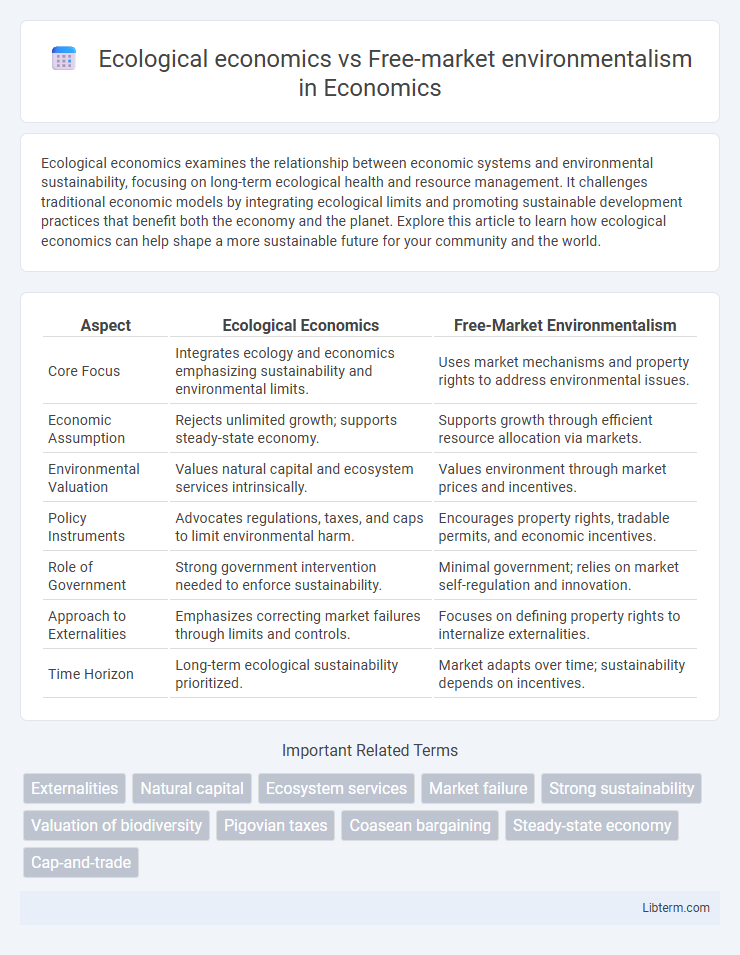Ecological economics examines the relationship between economic systems and environmental sustainability, focusing on long-term ecological health and resource management. It challenges traditional economic models by integrating ecological limits and promoting sustainable development practices that benefit both the economy and the planet. Explore this article to learn how ecological economics can help shape a more sustainable future for your community and the world.
Table of Comparison
| Aspect | Ecological Economics | Free-Market Environmentalism |
|---|---|---|
| Core Focus | Integrates ecology and economics emphasizing sustainability and environmental limits. | Uses market mechanisms and property rights to address environmental issues. |
| Economic Assumption | Rejects unlimited growth; supports steady-state economy. | Supports growth through efficient resource allocation via markets. |
| Environmental Valuation | Values natural capital and ecosystem services intrinsically. | Values environment through market prices and incentives. |
| Policy Instruments | Advocates regulations, taxes, and caps to limit environmental harm. | Encourages property rights, tradable permits, and economic incentives. |
| Role of Government | Strong government intervention needed to enforce sustainability. | Minimal government; relies on market self-regulation and innovation. |
| Approach to Externalities | Emphasizes correcting market failures through limits and controls. | Focuses on defining property rights to internalize externalities. |
| Time Horizon | Long-term ecological sustainability prioritized. | Market adapts over time; sustainability depends on incentives. |
Introduction to Ecological Economics and Free-Market Environmentalism
Ecological economics integrates ecological and economic systems, emphasizing sustainable resource use and long-term environmental health through interdisciplinary analysis. Free-market environmentalism advocates for property rights and market incentives to address environmental issues, promoting individual responsibility and voluntary exchanges as mechanisms for conservation. Both approaches aim to balance economic growth with environmental protection, but ecological economics prioritizes systemic sustainability, whereas free-market environmentalism focuses on market-based solutions.
Core Philosophies: Comparing Frameworks
Ecological economics centers on integrating environmental sustainability with economic systems by valuing natural capital and prioritizing long-term ecological health over short-term profits. Free-market environmentalism relies on property rights and market-based solutions, asserting that environmental issues can be addressed through voluntary exchanges and economic incentives without heavy government intervention. These contrasting core philosophies reflect differing trust in regulatory frameworks versus market mechanisms to achieve sustainable environmental outcomes.
Valuing Nature: Intrinsic vs Market-Based Approaches
Ecological economics emphasizes the intrinsic value of nature, recognizing ecosystems as complex, interdependent systems that provide essential services beyond market transactions. Free-market environmentalism relies on market-based approaches, assigning monetary value to natural resources through property rights and tradeable permits to incentivize conservation. Valuing nature intrinsically under ecological economics supports sustainable stewardship, while market-based methods prioritize efficiency and economic incentives for environmental protection.
Resource Allocation and Environmental Protection
Ecological economics prioritizes sustainable resource allocation by integrating environmental limits and ecosystem services into economic decision-making, promoting long-term ecological balance. Free-market environmentalism emphasizes market-based solutions, suggesting that well-defined property rights and market incentives efficiently allocate resources and encourage innovation in environmental protection. Both approaches address resource allocation and environmental preservation but differ in their reliance on centralized regulation versus decentralized market mechanisms.
Economic Growth and Environmental Sustainability
Ecological economics emphasizes the need to limit economic growth to maintain environmental sustainability by accounting for natural capital and ecosystem services in decision-making processes. Free-market environmentalism advocates for using market mechanisms and property rights to foster innovation and efficiency, asserting that economic growth can align with environmental protection when incentives are correctly structured. While ecological economics often supports steady-state economies to prevent resource depletion, free-market environmentalism relies on technological advancements and competitive markets to decouple growth from environmental harm.
Policy Instruments: Regulation vs Market Incentives
Ecological economics emphasizes regulatory policy instruments such as pollution caps, environmental standards, and government-mandated resource management to ensure sustainable use of natural capital. Free-market environmentalism advocates for market incentives like tradable pollution permits, property rights, and environmental taxes that align economic behavior with ecological goals. The key distinction lies in ecological economics prioritizing state intervention and long-term environmental stewardship, while free-market environmentalism promotes decentralized solutions driven by market signals and private ownership.
Addressing Externalities and Market Failures
Ecological economics emphasizes the integration of environmental values into economic decision-making by internalizing externalities through regulatory mechanisms, taxes, and quotas to correct market failures. Free-market environmentalism advocates for property rights and market incentives to address externalities, arguing that well-defined property rights lead to efficient resource management and reduced environmental degradation. Both approaches recognize market failures but propose contrasting solutions: ecological economics supports direct intervention, while free-market environmentalism relies on decentralized market processes.
Case Studies: Successes and Challenges
Ecological economics highlights the Yellowstone National Park wolf reintroduction as a success, balancing ecosystem health with economic benefits from increased tourism, while challenges include addressing complex feedback loops in resource management. Free-market environmentalism emphasizes tradable pollution permits in the U.S. Acid Rain Program as a cost-effective solution reducing sulfur dioxide emissions, but faces difficulties in ensuring equitable access and preventing market manipulation. Both frameworks demonstrate varied outcomes depending on regulatory design, stakeholder engagement, and ecological variables in real-world applications.
Critiques and Limitations of Each Approach
Ecological economics faces criticism for its reliance on integrating ecological and economic systems, often challenged due to difficulties in quantifying natural capital and ecosystem services, which can lead to subjective valuations. Free-market environmentalism is limited by its dependence on property rights and market mechanisms, yet struggles with public goods issues, externalities, and the tragedy of the commons, resulting in insufficient protection for non-excludable resources like air and biodiversity. Both approaches face critiques regarding scalability and effectiveness in addressing complex environmental problems such as climate change and biodiversity loss.
Future Directions in Environmental Economic Thought
Future directions in environmental economic thought emphasize integrating ecological economics' focus on sustainability and natural capital valuation with free-market environmentalism's reliance on property rights and market incentives. Advancements include developing hybrid models that balance regulatory frameworks and market-based solutions to enhance environmental governance. Emphasis on ecosystem services valuation, adaptive management, and decentralized decision-making signals a shift toward more dynamic, inclusive, and resilient environmental policies.
Ecological economics Infographic

 libterm.com
libterm.com